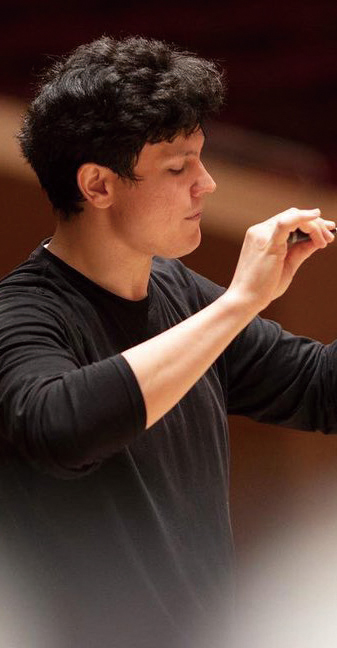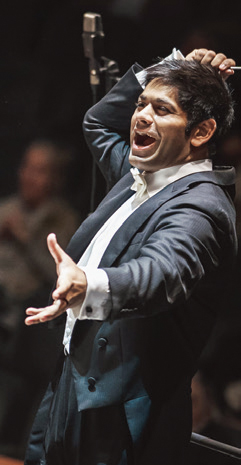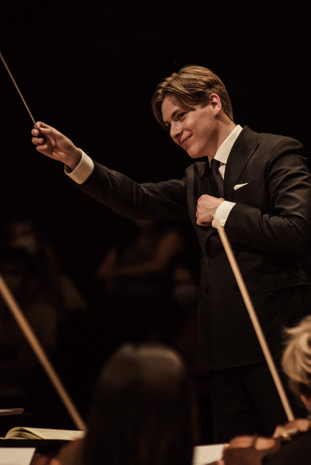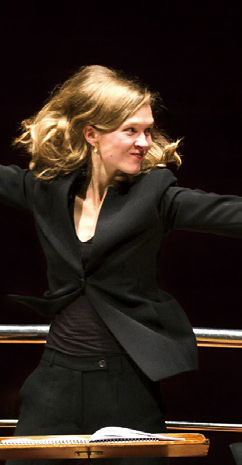노먼 레브레히트 칼럼

쇼카키모프 ©BR_Astrid Ackermann 
라하브 샤니 ©Marco Borggreve 
엘림 찬 ©Rahi-Rezvani 
로렌조 비오티 ©Teatro-alla-Scala 
알페시 초한©Michele Monasta 
클라우스 메켈레 ©MATHIAS BENGUIGUI PASCO AND CO 
카렘 하산 ©Marco_Borggreve 
미르가 그라지니테 틸라 ©Daniela_Schmidt-Langels
미래의 지휘자
‘거장’이라 불리던 이들 이래로, 지휘계의 맥이 끊겼다. 이를 봉합하고 나선 오늘의 차세대 지휘자들은 누굴까?
독일인 비평가 위르겐 케스팅은 올여름 잘츠부르크 페스티벌의 한 지휘자에 대해 “수치를 모르는 자아도취한 자”라고 칭하는 한편, 그 어느 지휘자도 축제의 흥행을 이끌지 못했다고 말해 파란을 일으켰다. 적어도 후자에 있어서, 그는 맞는 말을 했다.
클래식 음악의 몰락은 지휘자들의 비상(飛上)을 막았다. 무티, 바렌보임, 틸레만, 게르기예프, 래틀 같은 일부 베테랑들은 여전히 신문 일면을 장식하고 있지만, 중간 세대는 빈의 링슈트라세 대로에서 나체로 춤이라도 추지 않는 이상 관심을 받지 못할 것이다. 30여 년 전, 나는 저서 ‘거장 신화-클래식 음악의 종말과 권력을 추구한 위대한 지휘자들’을 마무리하며 다음과 같이 썼다. “위대한 지휘자들은 눈에 보이는 권력의 정점에 서서 자신들의 종족이 멸망으로 가는 길을 닦아 왔다.” 그 예측은 이제 실현되고 있다. 위대한 지휘자는 더 이상 현존하지 않는다.(편집자주_‘거장 신화’는 2014년 우리말로 번역(김재용)된 바 있다)
지휘계에 희망은 없는 걸까?
이제 우리에게 남은 건 다수의 평범한 핀란드인, 환한 웃음 가득한 젊은 여성들, 조작된 대회의 수상자들, 유명인 꿈나무들뿐이다. 지금껏 지휘계의 미래가 이렇게까지 암울했던 적은 없었다. 본인의 나이대에 비해 지나치게 어린 느낌의 민소매 차림을 한 그리스인 테오도르 쿠렌치스와 언론의 관심을 먹고 사는 구스타보 두다멜, 야니크 네제 세갱을 제외한다면 중년층은 텅 비어 있다. 그렇긴 하지만, 내가 위르겐 케스팅의 실존적인 암울함에는 동의하지 않는 이유를 설명해볼까 한다.
두 개의 양성소에서 황금 같은 인재들을 길러내기 시작했다. LA 필하모닉의 두다멜 펠로우십 제도는 유망한 젊은이들을 선발해, 이들에게 1년 동안 일절 타협이 없는 전통적인 방식의 견습직으로 활동하게 한다. 역경이 가득한 이 학교의 졸업생으로는 미르가 그라지니테 틸라(리투아니아)·엘림 찬(홍콩)·젬마 뉴(뉴질랜드)·가천 웡(싱가포르)·마르타 가르돌린스카(폴란드)가 있다. 이들 모두는 오케스트라 세계의 생존 경쟁에서 꽤 괜찮은 첫 번째 울타리 안에 안착하는 데 성공했다. 조짐이 좋지 않은가? 이게 다가 아니다.
네슬레(Nestlé)사가 매년 후원하는 잘츠부르크 페스티벌에서는 강력한 미르가와 세 명의 영국인인 케렘 하산, 벤 게르논, 조엘 샌더슨, 스위스의 유망주 로렌조 비오티, 우즈베키스탄의 아지즈 쇼카키모프에게 자리를 내어주었다. 우리는 미래의 인재 자원이 형성되는 것을 목도하고 있다. 비오티(1990~)는 네덜란드 국립 오페라를, 하산(1992~)은 오스트리아의 인스부르크 심포니를 맡았고, 쇼카키모프(1988~)는 스트라스부르 필하모닉에 둥지를 틀었다.
신고전주의를 고수했던 브루노 발터는 “지휘자란 태어나는 것이 아니라 만들어지는 것”이라고 말하곤 했다. 그리고 그 과정에는 재능, 지성, 매력, 건강한 신체, 수많은 행운과 무엇보다 가장 중요한 야망이 포함된다. 푸르뱅글러, 카를로스 클라이버, 첼리비다케 등 전설적인 지휘자들은 모두 상대를 무너뜨릴 때를 알고 있었다. 유망했던 다른 후보들은 무자비함이 모자라 실패하고 만 것이다.
주목해야 할 차세대 지휘자 6인
내가 지금 소개하려는 40대 미만의 지휘자 여섯 명은 성공에 필요한 자질을 갖추었고, 지난 세기 이래로 만난 그 어떤 이들보다 탄탄한 재능을 갖고 있다. 이 미래의 위대한 지휘자들을 특별한 순서 없이 추려 보았다.
알페시 초한(1990~)은 어린 시절부터 지낸 집에서 음악감독으로 있는 버밍엄 오페라 컴퍼니까지 버스로 출퇴근한다. 전 오페라 감독인 그레이엄 빅에게 발탁된 초한은 바그너의 ‘라인의 황금’과 쇼스타코비치의 ‘므첸스크의 맥베스 부인’으로 이미 영국 중부의 관객들과 음악가들을 압도했다. 현재 시티 오브 버밍엄 심포니를 맡고 있는 미르가가 내년에 떠나면 그 자리를 물려받게 될 것이라는 소문도 있지만, 그때쯤이면 초한은 버밍엄이 감당할 수 없을 만큼 성장할지도 모른다. 그는 이미 뒤셀도르프의 악단에서 계약직 자리를 획득했다.
미르가 그라지니테 틸라(1986~)는 홍보가 필요 없는 사람이다. 사실상 그녀가 버밍엄에 도착했던 5년 전부터 대형 악단들은 미르가를 잡기 위해 노력했다. 뉴욕 필하모닉은 관심을 공공연하게 밝혀왔고, 그녀가 살고 있는 잘츠부르크는 미르가를 여름 페스티벌의 고정 출연진으로 보고 있다. 두 아이의 엄마이자 가족을 우선하는 미르가이지만, 그녀에겐 맹렬한 야망과 넘치는 업무, 지칠 줄 모르는 에너지가 가득하다. 또한 미르가는 공연을 훌륭하게 마친 뒤 자신의 음악가들과 함께 사적인 노래 모임을 갖는 것을 좋아한다.
엘림 찬(1986~)은 앤트워프 심포니의 상임지휘자 겸 음악감독으로, 수많은 공연의 객원지휘자로도 이름을 알리고 있다. 조그만 체격과 다정다감한 성격을 갖고 있지만, 리허설에서는 강철과도 같은 단호함을 보이며 런던 심포니 오케스트라 주최 지휘 콩쿠르에서 우승한 이래로 박자 하나 놓치지 않고 있다.
런던 필하모니아 오케스트라에 새로 부임한 산투 마티아스 로발리(1985~)는 연습실에 들어가는 것만으로도 앙상블의 음색을 바꾸는 몇 안 되는 지휘자 중 하나이다. 선천적으로 재능을 타고난 그는 말수가 적은 핀란드인 중에서도 더욱 말이 없으며, 미르가와 비슷하게 그의 인기 또한 이미 드높다.
동료 핀란드인인 클라우스 메켈레(1996~)는 이미 파리 오케스트라와 오슬로 필하모닉을 책임지며, 데카(Decca)에서 시벨리우스 교향곡 7곡을 녹음하는 중이다. 너무 빨리, 너무 많은 걸 맡고 있진 않냐고? 우리는 첫 번째 음반을 기다리고 있다. 더블 버튼 슈트 차림으로 프로필 사진 포즈를 취하는 그는 어째 어른스러워 보이고 싶은 듯하다.
라하브 샤니(1989~)는 주빈 메타의 뒤를 이어 이스라엘 필하모닉을, 네제 세갱의 뒤를 이어 로테르담 필하모닉을 맡고 있다. 다니엘 바렌보임의 제자인 그는 베를린에 거주하며 피아니스트로도 페스티벌에 출연하고 있다. 이스라엘 필에서 그는 짧은 시간에도 불구하고 결단력과 사교성을 보여주며 레퍼토리와 평판을 바꿔 나가는 중이다.
지휘계의 미래는 밝다
이들 모두가 잘 될 것이라고 장담했다가는 내가 일자리를 잃게 될 수도 있겠지만, 대부분 끝까지 잘 버티리라고 내 직감은 말한다. 물론 그렇지 않다 하더라도, 다른 이들이 뒤따라올 것이다. 독일인 요아나 말비츠(1986~)는 육아 휴직으로 뉘른베르크 극장 음악감독직을 내려놓았지만 머지않아 다시 복귀할 것이다. 래틀의 전 어시스턴트인 덩컨 워드(1989~)는 네덜란드 오케스트라를 이끌고 있으며, 지휘계에서는 희귀한 미국인 라이언 밴크로프트(1989~)는 BBC 웨일즈 내셔널 오케스트라에서 지휘하고 있다. 러시아인 막심 에멜리아니체프(1988~)는 모차르트 전문가로 이름을 떨치고 있는데, 유행에 뒤처진 것 같기도 하지만 고음악 운동이 활력을 다한 현재로는 중요한 임무라고 볼 수 있다.
중간 세대가 실패한 곳에서 지휘봉을 이어받은 새로운 세대가 기회로 전율하고 있다. 지휘계의 미래는 밝다. 정치적 이슈가 재능의 맥박이 뛰어야 하는 동맥을 가로막고 있는 미국과 러시아를 제외한다면 전 세계 대부분이 그렇다. 이에 대해서는 추후 다뤄보도록 하겠다.
번역 김진
Conductors of the future
노먼 레브레히트 칼럼의 영어 원문을 함께 제공합니다
The German critic Jürgen Kesting caused a flutter at Salzburg this summer by calling out one maestro for ‘a shameless ego trip’ and claiming none of the rest had pulling power at the box-office. He was right on the second count, at least.
The collapse of classical recording left conductors without promotion. While a few old-timers – Muti, Barenboim, Thielemann, Gergiev, Rattle – remain headline names, the middle generation would not get more than a flicker of attention if they danced naked down Vienna’s Ringstrasse. Thirty years ago, I ended my book ‘The Maestro Myth’ with the words, ‘the great conductor has paved the way to his own extinction’. That prediction has now come to pass. The Great Conductor is defunct.
What we are left with is a slew of featureless Finns, toothy young women, rigged competition winners and outright wannabees. The future of conducting has never looked so bleak. With the exception of the sleeveless Greek Teodor Currentzis, who dresses one generation too young for his age, and the media-savvy Gustavo Dudamel and Nézet-Séguin, the middle-aged shelf is bare.
That said, I do not share Kesting’s existential gloom and I am about to tell you why. Two nurseries are starting to produce golden sticks. Dudamel’s fellowship scheme at the Los Angeles Philharmonic selected promising youngsters and given them a year’s old-fashioned apprenticeship in a unionised shop where the players take no prisoners. Graduates of this school of hard knocks include Mirga Gražinytė-Tyla (Lithuania), Elim Chan (Hong Kong), Gemma New (New Zealand), Kahchun Wong (Singapore) and Marta Gardolínska (Poland). All have now landed good first jobs around the middle of the orchestral snakes and ladders board. That’s promising, but there’s more.
In Salzburg the annual Nestlé competition has yielded the dominant Mirga, plus three Brits – Kerem Hasan, Ben Gernon and Joel Sandelson – a Swiss one-to-watch Lorenzo Viotti and a prodigiously gifted Uzbek, Aziz Shokhakimov. We are seeing the making of a future talent pool. Viotti, 31, is now in charge at Dutch National Opera; Hasan, 29, has an Austrian orchestra; while Shokhakimov, 32, is starting with the philharmonic orchestra of Strasbourg.
The augustan Bruno Walter used to say that conductors are not born, they have to be made. The ingredients include ability, intelligence, charm, good physique, a lot of luck and – crucially – ambition. Legends such as Furtwängler, Carlos Kleiber and Celibidache all knew when to go in for the kill. Many fine prospects have fallen short for lack of ruthlessness.
I believe the six under-40s I am about to present have got what it takes, and half a dozen talents is a bigger lineup than we have seen any time since the last century. These, in no determined order, are the big sticks of the future.
Alpesh Chauhan, 28, works a bus ride from where he grew up as music director of Birmingham Opera Company. Spotted by the late opera director Graham Vick, Chauhan has overwhelmed Midlands audiences and musicians with a prodigious Wagner Rheingold and Shostakovich Lady Macbeth of Mtsensk. Word on the street is that he could take over the city’s symphony orchestra when Mirga leaves next year, but Chauhan may have outgrown Birmingham by then. He has already landed a part-time link with the orchestra in Düsseldorf.
Mirga Gražinytė-Tyla, 35, needs no hype. Major bands have been bidding for her practically from the moment she arrived five years ago in Birmingham. The New York Philharmonic has made no secret of its interest. Salzburg, where she lives, sees her as a fixture at its summer festival. Mother of two, she is putting family first – but the ambition is fierce, the engagement total and the energy inexhaustible. She likes to have a private sing-song with her musicians after a good concert.
Elim Chan, 35, is making waves as music director in Antwerp and across a swathe of guest dates. Slightly built, sweetly personable and with a hint of steel about her in rehearsal, she has not missed a beat since winning a contest at the London Symphony Orchestra.
Santtu-Matias Rovali, 35, newly installed at London’s Philharmonia, is one of the rare conductors changes the sound of an ensemble just by entering the rehearsal room. Naturally gifted, he is short of words even for an inexpressive Finn, there’s already a buzz about him akin to Mirga’s.
Fellow-Finn Klaus Mäkelä, 25, is already head of the Orchestre de Paris and the Oslo Philharmonic, with whom he is recording the seven Sibelius symphonies for Decca. Too much, too soon? We await the first release. He poses for portraits in double-breasted suits to look more like a grown-up.
Lahav Shani, 32, has succeeded Zubin Mehta as music director at the Israel Philharmonic and Nézet-Séguin at the Rotterdam Philharmonic. A Daniel Barenboim protégé, he lives in Berlin and continues to accept festival dates as a piano soloist. At the Israel Phil he has been both decisive and diplomatic, changing repertoire and reputation in a very short space of time.
I’d be sacked by my insurers if I guaranteed that all of these talents will come good, but my instinct is that most will last the course. And, if they don’t, there are others coming up behind. The German Joana Mallwitz, 35, has just given up her Nuremberg job for a childbirth break but she will bounce back before long. The former Rattle assistant Duncan Ward, 32, leads a Dutch orchestra and a rare American Ryan Bancroft, 32, conducts the BBC national orchestra in Wales. The Russian Maxim Emelyanychev, 32, is making a name for himself as a Mozart specialist, unfashionable but essential now that the early-music movement has run out of puff.
Where the middle generation has failed, the new batons are quivering with opportunity. The future of conducting is looking bright – everywhere except in Russia and America, where political concerns have clogged the arteries that ought to be pulsing with talent. But that’s a topic for another day. Norman Lebrecht
글 노먼 레브레히트
영국의 음악·문화 평론가이자 소설가. ‘텔레그래프’지, ‘스탠더즈’지 등 여러 매체에 기고해왔으며, 지금 이 순간에도 자신의 블로그(www.slippedisc.com)를 통해 음악계 뉴스를 발 빠르게 전한다







